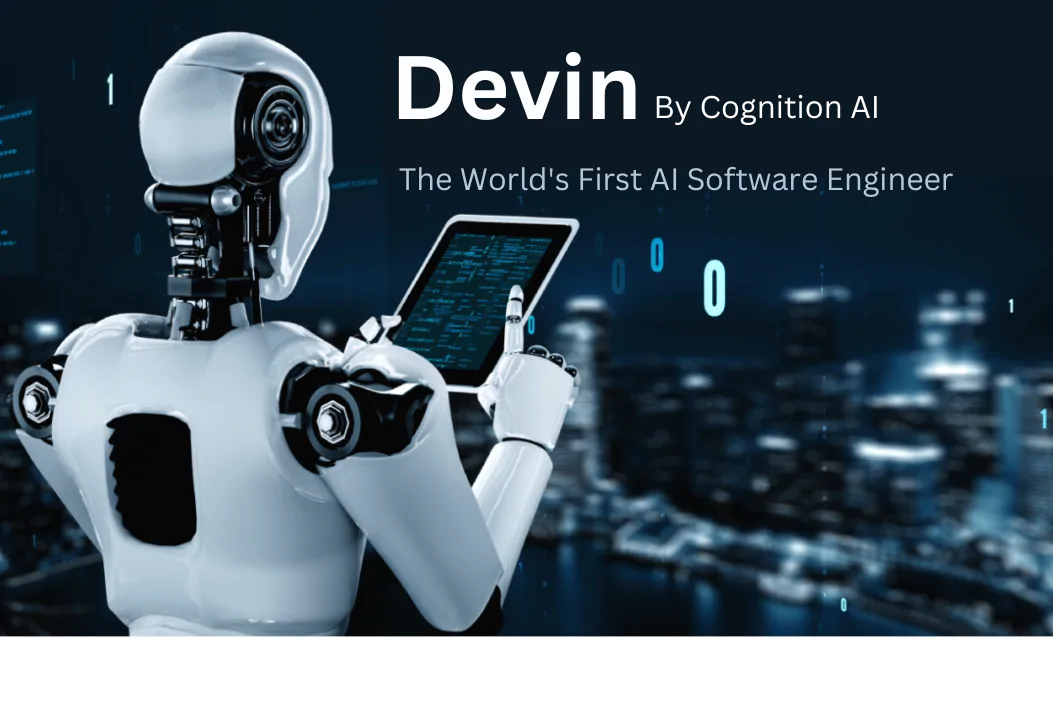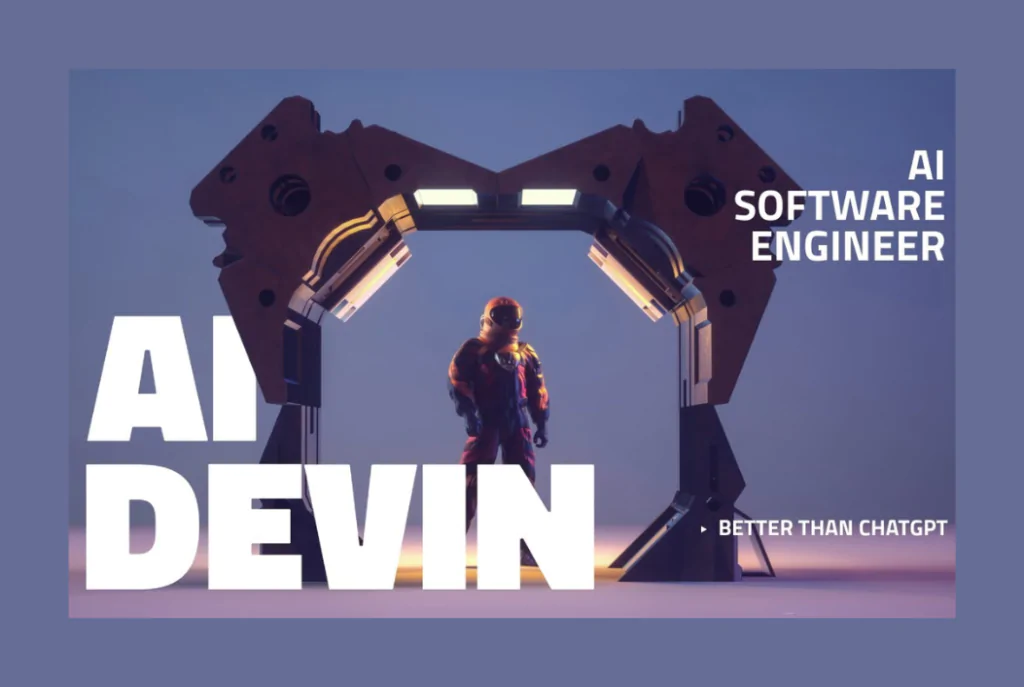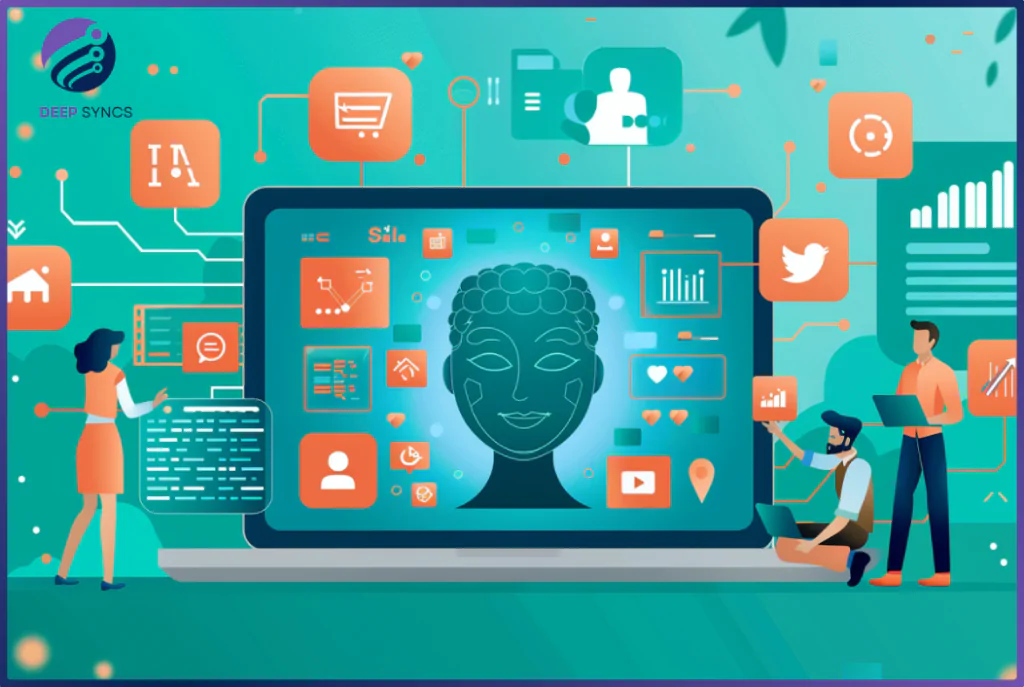The software development landscape, long dominated by human ingenuity, is witnessing a paradigm shift. Enter Devin, an artificial intelligence (AI) system created by Cognition AI, heralded as the world’s first AI software engineer. This groundbreaking development promises to revolutionize the way developers approach their craft, potentially ushering in a new era of collaboration and efficiency.
Devin isn’t your average code-generating tool. Unlike its predecessors, it aspires to transcend mere line-by-line automation. Instead, it aims to function as an intelligent assistant, capable of understanding complex project requirements and translating them into functional code. This fundamental distinction has ignited a wave of excitement within the developer community, raising questions about the future of software development and the potential impact of AI on this ever-evolving field.
This blog delves deeper into the intricacies of Devin, exploring its capabilities, its potential to reshape the industry, and the intriguing questions it raises. We’ll dissect its functionalities, analyze its potential benefits and drawbacks, and examine how it might redefine the human-machine partnership in software development.

What is Devin? – An AI Teammate, Not a Coding Overlord
Devin, the brainchild of Cognition AI, transcends the limitations of traditional code generation tools. It aspires to be more than just an automated code-writing machine. Instead, Devin positions itself as an intelligent teammate for human software engineers.
Here’s what differentiates Devin from its predecessors:
- Understanding Complexity: Traditional code generators often struggle with intricate project requirements. Devin, however, aims to grasp the bigger picture. It can analyze the purpose of a project, translate those goals into actionable steps, and then generate the code to achieve them.
- Beyond Automation: Code generation tools excel at automating repetitive tasks, but Devin aspires to go further. It can handle debugging and problem-solving, identifying and potentially fixing errors within the code it generates.
- Continuous Learning: Devin isn’t static. It possesses the ability to learn from its experiences, including successes and failures. This continuous learning loop allows Devin to refine its skills and improve its code generation capabilities over time.
This shift in functionality positions Devin as a valuable collaborator, not a potential usurper of human coders. While it automates tedious tasks and streamlines workflows, Devin relies on human expertise for guidance and direction. This collaborative approach holds the potential to unlock a new era of software development, where human ingenuity and AI capabilities work in tandem.
In the next section, we’ll delve into the specific functionalities Devin offers, exploring how it assists software engineers in various aspects of their work.
Unveiling Devin’s Toolkit: Code Generation, Problem-Solving, and Beyond
Devin’s capabilities extend far beyond simply spitting out lines of code. It boasts a diverse toolkit designed to empower software engineers and streamline their workflows. Let’s explore some of Devin’s key functionalities:
- Code Generation on Demand: Imagine outlining your software’s functionalities and having Devin translate those ideas into working code. Devin can analyze your instructions, taking into account programming languages, frameworks, and desired functionalities. Based on this input, it can generate complete source code, potentially saving developers significant time and effort.
- Level of Complexity: While details are still emerging, Devin is expected to handle a range of complexities. It can likely tackle basic functionalities to more intricate algorithms, depending on the clarity and detail of the provided instructions.
- Programming Language Proficiency: Information regarding Devin’s supported programming languages is limited at this point. However, considering its goal of comprehensive assistance, it’s reasonable to expect proficiency in several popular languages.
- Website and Software Creation: Devin’s capabilities extend beyond pure code generation. It can leverage its understanding of programming principles to create entire websites and software applications. This functionality could be particularly valuable for prototyping or developing basic applications.
- Debugging Powerhouse: Hitting a coding roadblock? Devin can step in as a debugging partner. Its ability to analyze code and identify potential errors can significantly reduce troubleshooting time for developers.
- A Perpetual Learner: One of Devin’s most intriguing features is its ability to learn and improve. By analyzing its past successes and failures, Devin can refine its code generation algorithms and problem-solving techniques. This continuous learning loop holds immense potential for the future of its capabilities.
In the next section, we’ll explore the potential impact of Devin on the software development landscape, examining its influence on developer productivity, job markets, and the future of human-AI collaboration.
The Devin Effect: Reshaping Productivity, Jobs, and Collaboration
Devin’s arrival on the scene promises to be a game-changer for software development. Let’s delve into its potential impact on various aspects of the industry:
- Boosting Developer Productivity: Repetitive coding tasks, debugging, and boilerplate code generation can consume a significant portion of a developer’s time. Devin’s ability to automate these processes can free up developers to focus on more strategic and creative aspects of software development. This translates to a potential surge in overall developer productivity, allowing them to tackle more complex problems and contribute to larger-scale projects.
- A Job Market in Flux: Concerns regarding Devin usurping human developers are natural. However, it’s more likely that Devin will alter the job market rather than replace entire workforces. Junior developers might face increased competition as Devin simplifies basic coding tasks. However, the demand for skilled developers with expertise in complex problem-solving, system architecture, and human-computer interaction is likely to remain strong, potentially creating new job opportunities focused on managing and collaborating with AI tools like Devin.
- The Future of Human-AI Collaboration: Devin’s true potential lies in its ability to work alongside human engineers, not replace them. By automating tedious tasks and streamlining workflows, Devin can empower developers to focus on their core strengths: creativity, problem-solving, and strategic thinking. This collaborative approach holds the promise of accelerating innovation and pushing the boundaries of what’s possible in software development.
In the next section, we’ll balance the optimism with a realistic assessment, exploring the potential benefits and limitations of using Devin.
Devin’s Benefits and Limitations
Devin’s arrival in the software development world is undoubtedly exciting. However, a balanced perspective requires acknowledging both its potential benefits and limitations.
Benefits:
- Enhanced Developer Productivity: As discussed earlier, Devin’s ability to automate repetitive tasks and generate code based on instructions can significantly free up developers’ time. This allows them to focus on higher-level aspects of software development, such as design, architecture, and problem-solving.
- Reduced Development Time: By automating tasks and streamlining workflows, Devin has the potential to accelerate the software development lifecycle. This can lead to faster time-to-market for new products and features.
- Improved Code Quality: Devin’s ability to learn and improve continuously can lead to the generation of cleaner, more efficient code. Its debugging capabilities can also help identify and fix errors early in the development process.
- Democratization of Development: Devin’s user-friendly interface (if applicable) could potentially allow individuals with less coding experience to create basic applications or prototypes. This could democratize software development to some extent.
Limitations:
- Complexity Barrier: While Devin may handle a range of complexities, it’s unlikely to master intricate or highly specialized coding tasks at this stage. Human expertise will likely remain crucial for tackling these challenges.
- Limited Creativity: Software development thrives on human ingenuity and creative problem-solving. While Devin can be a valuable tool, it currently lacks the creative spark to fully replace the human element in software design and innovation.
- Integration Challenges: Integrating Devin seamlessly into existing development workflows could pose challenges. Developers might need to adapt their processes to work effectively with this new AI tool.
- Ethical Considerations: As with any powerful AI technology, ethical considerations around bias and potential misuse need to be addressed.
By acknowledging both the benefits and limitations of Devin, we can foster a realistic understanding of its potential impact and navigate its integration into the software development landscape responsibly.
A Glimpse into the Future: Devin and the Evolving Landscape of Software Development
Devin’s arrival marks a significant milestone in the evolution of software development. It serves as a stepping stone towards a future where AI plays a more prominent role in coding practices. Here’s a glimpse into what this future might hold:
- Rise of Specialized AI Tools: Devin represents the first wave of AI assistants specifically designed for software engineers. We can expect to see a proliferation of specialized AI tools catering to various aspects of development, such as code optimization, testing, and security analysis.
- The Democratization of Coding: User-friendly AI tools like Devin could potentially lower the barrier to entry for software development. Individuals with a basic understanding of programming principles might be empowered to create simple applications or prototypes, fostering broader participation in the field.
- Human-AI Collaboration Redefined: The future of software development lies in seamless collaboration between humans and AI. Developers will leverage AI tools like Devin to automate tasks and gain valuable insights, while focusing their expertise on strategic decision-making and creative problem-solving.
- Shifting Skillsets: As AI takes over more routine tasks, the skillsets demanded from developers will likely evolve. A focus on critical thinking, problem-solving, system architecture, and human-computer interaction is likely to become even more crucial.
- Ethical Considerations at the Forefront: As AI plays a more prominent role in software development, ethical considerations around bias, transparency, and potential misuse will require careful attention. Developers and organizations will need to establish frameworks and best practices to ensure responsible AI integration.
Devin’s emergence is just the beginning. As AI technology continues to advance, we can expect even more transformative tools and applications to reshape the software development landscape. The future belongs to those who can effectively leverage the power of AI while harnessing the irreplaceable strengths of human ingenuity.
Keeping up with Devin: Resources and Looking Ahead
Devin’s development is a dynamic process. Here’s how you can stay updated on its progress and learn more about this innovative AI tool:
- Following Cognition AI: Keeping an eye on Cognition AI’s official channels (website and social media like Twitter [placeholder for Twitter link when available]) is a great way to stay abreast of any updates, announcements, or new features related to Devin.
- Industry News and Publications: Reputable technology news websites and publications will likely cover significant developments surrounding Devin. Following these sources can provide valuable insights and expert analysis.

- Developer Communities and Forums: Online developer communities and forums can be a treasure trove of information and discussions about Devin. Here, you can connect with other developers who are exploring this tool and share your own experiences or questions.
- Official Documentation (if available): Once Devin becomes more widely available, Cognition AI might release official documentation that provides detailed instructions, tutorials, and best practices for using the tool. Keep an eye out for these resources on Cognition AI’s website.
- DeepSycn’s AI News: DeepSycn’s daily AI news section is another excellent resource for staying up-to-date on the latest advancements in artificial intelligence, including potential coverage of Devin’s progress.
By staying informed and actively engaging with the developer community, you can ensure you’re on the leading edge of this revolutionary technology.
Frequently Asked Questions (FAQ)
- Is Devin safe to use?
As with any AI technology, safety is a primary concern. The specifics of Devin’s safety measures haven’t been publicly disclosed yet. However, it’s reasonable to expect Cognition AI to prioritize safeguards against potential biases or errors in the code Devin generates.
- Does Devin require any coding knowledge to operate?
The level of coding knowledge required to operate Devin remains unclear. Ideally, Devin should be designed with user-friendliness in mind, allowing developers with varying levels of experience to leverage its capabilities.
- How much does Devin cost?
There’s no official information available regarding Devin’s pricing model at this time. Cognition AI might offer different subscription plans or pricing structures depending on the target user base.
- Can Devin replace human software engineers?
Devin is unlikely to replace human software engineers entirely. Instead, it’s envisioned as a collaborative tool, automating tedious tasks and freeing up developers to focus on more strategic aspects of software development.
- What are the limitations of Devin?
While Devin promises significant advancements, it likely has limitations. It might struggle with highly complex coding tasks or lack the human touch for creative problem-solving and design. Additionally, ethical considerations around potential biases and responsible AI integration need to be addressed.
- How will Devin impact the job market for software engineers?
Devin might affect the job market for junior developers, as it can automate basic coding tasks. However, the demand for skilled developers with expertise in complex problem-solving, system architecture, and human-computer interaction is likely to remain strong.



I do not even know how I ended up here but I thought this post was great I dont know who you are but definitely youre going to a famous blogger if you arent already Cheers.
Заказать двери на заказ в Москве
Производство дверей на заказ по индивидуальным размерам
Как выбрать дверей на заказ
Виды и оттенки дверей на заказ
Двери на заказ: доставка и монтаж дверей на заказ
Какие двери на заказ лучше выбрать? варианты дверей на заказ
Шпонированные двери на заказ: преимущества и недостатки
Металлические двери на заказ: надежность и безопасность
Двери на заказ у мастеров-ремесленников
выбор дверей https://www.mebel-finest.ru.
Insightful piece